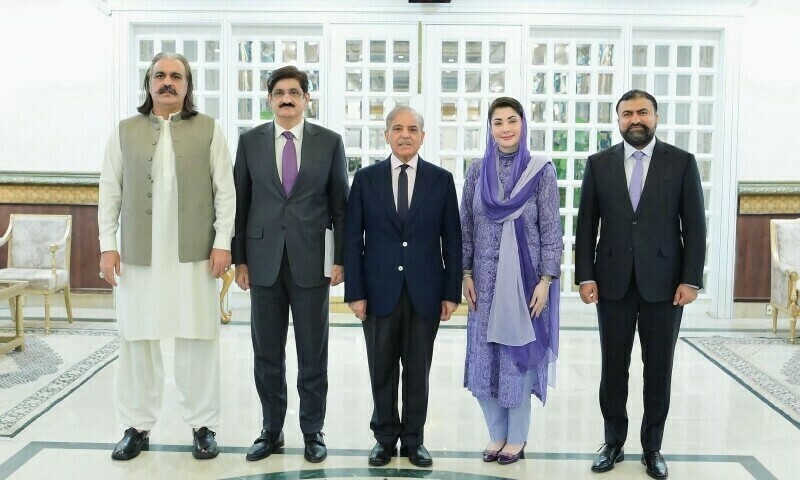There is some realisation in corridors of power that denial of provincial autonomy as defined by the 18th constitutional amendment is a significant cause for federal financial woes.
And implicit in this recognition, in reality, is that the time for centralised, arbitrary control of the country’s economic affairs seems to be over. This is somewhat obvious from how the water canal issue was finally settled by consensus in the Council of Common Interests (CCI). That means that centralisation has to be based on participatory federal democracy.
During the April 28th CCI meeting, the federal government informed the four provinces that it was in the process of establishing the 11th National Finance Commission (NFC) to finalise the 8th NFC Award and also a new formula for distribution of resources.
The finance ministry says it spent Rs638 billion on health, education and social protection, which, under the constitution, are provincial matters. The amount does not include the development spending.
The Khyber Pakhtunkhwa (KP) government pressed the federal government in the CCI to call the meeting of the 10th NFC and announce an interim award, says Muzammil Aslam, KP’s Finance Adviser to the chief minister.
Government gears up to transfer various federal bodies to provincial control as per the 18th constitutional amendment
Deputy Prime Minister Ishaq Dar recently stressed the need for revisiting the NFC Award and phasing out overlapping federal bodies that contradict the spirit of devolution.
Addressing the final session of the 38th Annual General Meeting and Conference of the Pakistan Society of Development Economists, Mr Dar said that various federal bodies should be transferred to the provinces as per the 18th constitutional amendment.
Many analysts believe that subjects now proposed to be devolved, such as health and education sectors, would be better managed by local bodies
The strengthening of federating units is inevitable for a strong federation, he said, adding that Pakistan is blessed with immense natural resources and all provinces have unique strengths and potentials. The new Agricultural Tax Law, to be enforced from July 1, it may be added, is estimated to yield additional provincial revenue of over Rs500bn in FY26.
The government has already written letters to the provinces and sought their nominations for technical members for the 11th National Finance Commission. Sindh has again nominated Dr Asad Sayeed as its technical member, while its finance minister will be the other constitutionally nominated member.
The KP government has not yet nominated its technical member for the 11th Commission, as it wanted the meeting of the 10th Commission before the budget to get its due share on account of net hydel profit and merged districts, explains Mr Aslam.
Furthermore, serious claims stating that Article 140A of the constitution (which binds the provincial government to transfer political, administrative and financial powers to the elected representatives of the people) has been ignored and the Supreme Court decision in this regard has not been implemented also flow from the centralisation of power and authority at the provincial level. Many analysts believe that subjects now proposed to be devolved, such as health and education sectors, would be better managed by local bodies.
“The time for centralised control is over; it is time to govern from the grassroots,” argue analysts at Dawn. When something as basic as a functioning union council is absent in over a quarter of Balochistan’s areas for more than two years after elections, it sends a clear message: the local government there is not a priority. The yet elusive goal of winning the hearts of the estranged people of Balochistan can start off from focusing on the resolution of this most fundamental problem, says a The Express Tribune editorial.
On May 1, the Election Commission of Pakistan (ECP) issued a stern warning to the government over persistent delays in holding local government elections in Islamabad. Every time the ECP completes preparations, it said, new amendments are introduced. The Commission has threatened to issue binding directives to the government if it fails to act promptly.
The Punjab Local Government Bill 2025 is currently awaiting approval from the provincial assembly, now being considered by its Standing Committee. The bill provides for the abolition of the district government council, replacing it with a district authority with the deputy commissioner of each district serving as chairmen.
The District Executive Board will have the chief executive officers of all departments as secretaries and the heads of all departments, including the District Health Department, Education Department, Social Welfare Department, Population Control, Sports, Transport, Civil Defence, Public Health Engineering, Arts and Culture and Tourism Department, as its members.
The Speaker of the Punjab Assembly, Malik Ahmed Khan, claimed that all political parties were asked to sit together and prepare this bill to ensure that there was no objection from the opposition. “The bill has been severely criticised by PTI members, and even an unknown number of PML-N members oppose it.”
In KP, the representatives of local bodies told newsmen on April 25 that despite repeated assurances from the provincial government, essential administrative and financial support, including development funds, has been denied for two years, leaving the local government unable to address basic community needs.
Published in Dawn, The Business and Finance Weekly, May 12th, 2025


